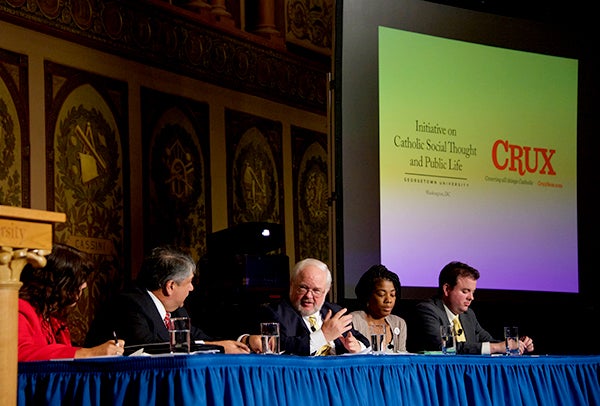Title: Panel Expresses Hope for Pope’s Support of Income Equality, Families
Georgetown’s Initiative on Catholic Social Thought and Public Life gathers academic and labor leaders to discuss the economic pressures affecting American families as the nation prepares for the first U.S. visit of Pope Francis.
– Two weeks before Pope Francis’ historic visit to the United States, academics, journalists, thought leaders and the president of the AFL-CIO sat down at Georgetown Sept. 9 to talk about economic pressures facing families.
Georgetown’s initiative on Catholic Social Thought and Public Life, and The Boston Globe’s Crux sponsored the panel discussion, which also addressed the upcoming Synod on Bishops of the Family, and how wages and poverty impact family formation, stability and child well-being.
Theodore Cardinal McCarrick made opening remarks, and Vatican analystJohn L. Allen Jr., associate editor of Crux and The Boston Globe,previewed the papal visit to the United States and the Synod on the Family in relation to economics for the Gaston Hall audience.
Rigged Rules
“Unemployment, falling wages and poverty destroys families and blocks upward mobility,” said AFL-CIO President Richard Trumka after the panel discussion commenced. “The single greatest determinant of how a child does in school right nowis that child’s family income level.”
He said every day there is a young man on a street corner in places like Northeast D.C. and Baltimore making a choice between following his hard-working, law-abiding parents into the same hopeless path of poverty or pursuing a life of crime.
“The rules have been rigged against Americans for too many years,” Trumka said. “We need to change those rules and to create an economy that the Holy Father talks about that’s inclusive, that allows that immigrant to earn a fair life, that allows a minority to have the same opportunity that I did as a white kid.”

“That’s what we’re fighting against,” he said. “And that’s why we’re so awful excited about the Holy Father coming to talk about those things and give every one of those kids standing on a corner somewhere about to make a decision some real hope.”
Other panelists included Michael Strain, deputy director of economic policy studies at the American Enterprise Institute; Maryann Cusimano Love, associate professor of international relations at the Catholic University of America; and Tarshea Smith, a union organizer who once worked as a cashier at Georgetown.
Helping the Vulnerable
“It’s important to look at some of the rules that we are discussing and how those rules affect the most vulnerable people, who again as Catholics we are called to put first in our concern,” Strain said in response to some of Trumka’s remarks.
But while he agreed that the heads of households who work full time need to make a living wage, he claimed that the likelihood of people who work full time year round being in poverty is 3 percent.
He also disagreed about raising the minimum wage, saying it would increase the costs of prices low-income workers face when they shop and go out to eat.
Resources for Mothers
Cusimano Love talked about the link between women’s economic well-being and healthy families.
“Women’s economic empowerment is not just some boutique issue or an issue for women’s rights people to be attended to,” she said. “If you care about families, you need to be giving the resources to mothers to care for their children.”
Smith, who raised two boys by herself on a cashier’s salary, said she would like to see Pope Francis address the struggles that working people face every day, including the right to organize without fear of reprisal.
“I think a lot of the time working single mothers work two and three jobs, and you’re not able to come home and cook a healthy meal for your kid because you’ve been working all day or you can’t afford to buy food that’s healthy for your kid,” she explained. “You’re working a full-time job, receiving poverty wages, and because you are working one job and you’re not receiving enough wages to take care of your family, you have to get another one.”
She said being able to take care of a family with one job allows workers to both provide for and parent their children.
The Chance to Work
“The one thing that seems to be missing in this debate, which is at the core of Catholic teaching, is that everybody who can work should have a chance to work, and that work should provide a decent living,” Carr said.
“And while we’ve made lots of progress in some areas and fallen short in others,” he added, “I find precious little discussion, from the Democrats or Republicans … about how we make sure that everybody has a chance to work.”